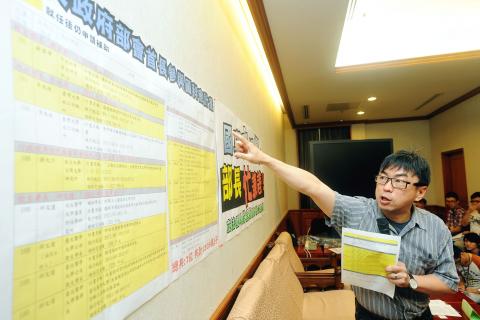Democratic Progressive Party (DPP) lawmakers yesterday accused government officials, including Premier Jiang Yi-huah (江宜樺), of seeking to take advantage of the pension reform and research programs funded by the National Science Council to enrich themselves.
A Cabinet proposal to amend the Act Governing the Recompense for the Discharge of Special Political Appointees (政務人員退職撫卹條例) would increase Jiang’s retirement pension by NT$12 million (US$400,000), DPP Legislator Chen Chi-mai (陳其邁) told a press conference.
“While the retirement pay of private and public-sector workers will shrink because of the financial problems plaguing the various pension programs, Jiang will make a fortune after the reform [of the pension system]. This act is like looting a burning house,” Chen said.

Photo: Lin Cheng-kung, Taipei Times
If Jiang retires in 2016, he will have accumulated 25 years of service — having served 17 years as a public school teacher in addition to his years of service in government — which will qualify him for pension payment, Chen said.
The proposed change in the calculation method would boost Jiang’s pension from NT$2.85 million to NT$14.87 million, he added.
Sacrificing others and benefiting oneself is not the right way to carry out pension reform, the lawmaker said.
At a separate news conference, DPP Legislator Tuan Yi-kang (段宜康) slammed Cabinet officials for doubling as project leaders in research programs sponsored or funded by the National Science Council, saying it has raised questions about their integrity and ability to focus on government affairs.
Minister of the Interior Lee Hong-yuan (李鴻源), Minister of Education Chiang Wei-ling (蔣偉寧), Atomic Energy Council Minister Tsai Chuen-horng (蔡春鴻), Council for Economic Planning and Development Minister Kuan Chung-min (管中閔), Council of Indigenous Peoples Minister Sun Ta-chuan (孫大川), Department of Health Minister Chiu Wen-ta (邱文達) and Minister Without Portfolio Schive Chi (薛琦) have all served as project leaders for the council’s programs, receiving subsidies of more than NT$15 million after assuming their current posts, Tuan said.
“It seems to me that their current posts are their part-time jobs,” he said, adding that the Cabinet members should resign from these research projects.
In response, National Science Council official Cheng Chung-fen (鄭瓊芬) told the press conference that academics who serve in the government, except those who are posted overseas, can apply for research subsidies, but they are prohibited from receiving payment from the program as long as they are still working for a government agency.
Executive Yuan spokesperson Cheng Li-wun (鄭麗文) last night called the allegations a “malicious” attempt to “defame” academics-turned-politicians.
It is “disappointing” that the DPP thinks the academics decided to work for the government for the sole purpose of “fattening their purses,” Cheng said.
The proposed amendment to the Act Governing the Recompense for the Discharge of Special Political Appointees was drafted long before the government launched plans to reform the nation’s pension systems, Cheng said.
If the proposed pension reforms were adopted, a professor who taught for 30 years and lives 20 years after retirement could receive a pension of NT$17.46 million in total, Cheng said.
Jiang would have received NT$17.46 million if he continued teaching to complete his 30 years of service in school, higher than the NT$12 million mentioned, Cheng said.
Cheng said Jiang would not be eligible to apply for pension if he leaves the government on May 20, 2016, because his years of service in academia and in government would add up to less than 25 years.
There was no truth to the DPP’s allegations, Cheng said.

The Mainland Affairs Council (MAC) today condemned the Chinese Communist Party (CCP) after the Czech officials confirmed that Chinese agents had surveilled Vice President Hsiao Bi-khim (蕭美琴) during her visit to Prague in March last year. Czech Military Intelligence director Petr Bartovsky yesterday said that Chinese operatives had attempted to create the conditions to carry out a demonstrative incident involving Hsiao, going as far as to plan a collision with her car. Hsiao was vice president-elect at the time. The MAC said that it has requested an explanation and demanded a public apology from Beijing. The CCP has repeatedly ignored the desires

Many Chinese spouses required to submit proof of having renounced their Chinese household registration have either completed the process or provided affidavits ahead of the June 30 deadline, the Mainland Affairs Council (MAC) said on Thursday. Of the 12,146 people required to submit the proof, 5,534 had done so as of Wednesday, MAC deputy head and spokesperson Liang Wen-chieh (梁文傑) said. Another 2,572 people who met conditions for exemption or deferral from submitting proof of deregistration — such as those with serious illnesses or injuries — have submitted affidavits instead, he said. “As long as individuals are willing to cooperate with the legal

The Ma-anshan Nuclear Power Plant’s license has expired and it cannot simply be restarted, the Executive Yuan said today, ahead of national debates on the nuclear power referendum. The No. 2 reactor at the Ma-anshan Nuclear Power Plant in Pingtung County was disconnected from the nation’s power grid and completely shut down on May 17, the day its license expired. The government would prioritize people’s safety and conduct necessary evaluations and checks if there is a need to extend the service life of the reactor, Executive Yuan spokeswoman Michelle Lee (李慧芝) told a news conference. Lee said that the referendum would read: “Do

Taiwan's Vice President Hsiao Bi-khim (蕭美琴) said Saturday that she would not be intimidated by the Chinese Communist Party (CCP), following reports that Chinese agents planned to ram her car during a visit to the Czech Republic last year. "I had a great visit to Prague & thank the Czech authorities for their hospitality & ensuring my safety," Hsiao said on social media platform X. "The CCP's unlawful activities will NOT intimidate me from voicing Taiwan's interests in the international community," she wrote. Hsiao visited the Czech Republic on March 18 last year as vice president-elect and met with Czech Senate leadership, including